#yeah its totally my interpretation of the inner demon reveal
Text
George Karizaki and the Tragic Clown Paradox
(aka) The George Karizaki Dilemma — My George Character Analysis
WARNING: This essay goes into dark topics such as child abuse, trauma, and many other touchy and sensitive topics. Read at your own risk, basically. Also contains spoilers up to episode 48 of Revice.
Warning, again—sensitive topics ahead.
big thanks to @alpona for inspiring me to actually write and post this.
My Interpretation of the Inner Demon Reveal
Vulnerability is defined in the Oxford Dictionary as: “the quality or state of being exposed to the possibility of being attacked or harmed, either physically or emotionally.” George Karizaki is a character that uses humor to disguise vulnerability. On the surface he comes off as more of an unbothered-genius, or mad scientist archetype. He works on what he likes, moral or not, all with an infuriating cocky-smile on his face. But humor isn’t the only thing George uses to hide his vulnerabilities, the very mask of ‘mad scientist,’ or a ‘villain’ caricature/persona is one of the other substantial ways George disguises his own traumas, fears, and pains. At the heart of it all, George cannot be analyzed without being placed in the “Tragic Clown Paradox.” Or— the ‘sad clown paradox’ as wikipedia calls it.
Wikipedia defines said paradox as: “The contradictory association between comedy and mental disorders such as depression and anxiety.”
More specifically, the link between humor and trauma. The paradox here, of course, being the fact that clowns—who are associated with laughter, fun, etc.—are actually the saddest or perhaps loneliest individuals in the room.
This analysis seeks to examine George Karizaki as a character: how he’s being presented, his type of humor, and most importantly—how it all relates to his trauma.
First on the list of analysis then, is the clown archetype and why I think George fits particularly well into it, and what that might mean for the character. In the article “The Great Comedians: Personality & Other Factors,” Samuel S. Janus states:
“The world of theatre has always found meaningfully symbolic the alternate faces of comedy and tragedy. Historically, court jesters were tragicomic figures— the embodiment of the bittersweet of life. Among the oppressed, the role of social critic has been the comedian's forte. Freud indicated that humor is a release for anxiety, to quote Abe burrows: ‘The comedian must practice his comedy in order to avoid destroying himself.’ Jack Carter, another leading humanist, says: ‘the funny part, the laughter, is given to the audience, but the comedian is left with the bitter dregs.’ Comedy has been described by a leading theologian as: ‘The ability to laugh at one’s own tragedy.’”
This is a particularly powerful section looking at the role of the tragicomic—the jester, the clown; and just how entwined with tragedy said comic is. Now, examining George’s portrayal in the show, fifty-one seconds into the first episode of Revice we are introduced to George first via his voice-over explanation about the Giff stamp. Then he brings up the idea of fighting demons with demons and with a snap of his fingers he brings up Daiji’s profile. Here we see George as a confident scientist. He obviously has a plan and knows what he’s doing. All, as stated previously, with a cocky-smile on his face.
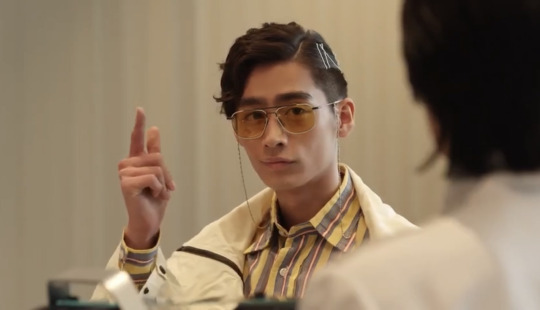
At Daiji’s coronation he cuts off Hiromi and pushes him humorously out of the way, saying he’s ‘taking too long.’ (This is notably also the first episode where we hear mention of his father and/or his father’s scientific legacy.) During the entire attack at the coronation, George is shown to be one of the only people not panicking. He’s rational and level-headed, even warning Hiromi not to try using the vistamp because it would be too strong for him. But then refusing to intervene or do anything more, letting Hiromi go through (and fail) at transforming. Simply stating: “See?” when things go wrong. This—from the standpoint of the audience, is also quite humorous.
George takes on this theatrical jester archetype throughout the entirety of the series, sarcastically commenting on the sidelines as things take place within the central plotline. Like with Hiromi’s failed henshin. In “Fools are Everywhere” Beatrice Otto takes notice that ‘It is the nature of jesters to speak their minds when the mood takes them, regardless of the consequences.” In fiction, and real life, jesters employ a variety of skills. Such as storytelling. In fact, the modern term derives from gestour, or jestour, Anglo-Norman (French) meaning ‘storyteller’ or ‘minstrel.’ (Wikipedia) Jesters have a privilege of mocking/stating the truth to those in power (King) and being able to get away with it. George Karizaki is shown (like in episode 1) to mock, narrate, or comment on a situational folly or irony—again, such as Hiromi’s failed transformation.
There are, of course, other notable instances of George’s jester antics—such as in episode 2, when Hiromi is informed he’s been demoted. Stating: “Your disgraceful failures to protect our Vistamp research labs AND inauguration ceremony have led you here.” So truthful and mean that you, as the audience, can’t help but feel bad and be amused. But instead of ending it there, George puts on that mocking smile of his and says in English, “Don’t mind, Hiromi.”

George, like most jesters, are passive commentators rather than active forces within the narrative. They spectate. In fact, the most active thing George does is create vistamps to be used, which is barely, if ever, shown on screen. Yet somehow George still manages to manipulate and dictate main storyline events. Often working as the catalyst for something to happen in the episode. Such as when he gives Daiji a henshin device, or when he sticks a tracker on something stolen from their base in episode 14/15.
Moving on to his sense of humor, George’s humor is a mix between self-enhancing humor that: “Involves a generally humorous outlook on life, a tendency to be frequently amused by the incongruities of life, and to maintain a humorous perspective even in the face of adversity,” (Like George at the coronation in episode 1), and Aggressive Humor which “relates to the use of sarcasm, teasing, ridicule, derision, ‘put down’ or disparagement humor.” Both are used to enhance the self, and the second is used to enhance the self at the expense of others, specifically.
In Scott Kaufman’s and Aaron Kozbelt’s study, “The Tears of a Clown: Understanding Comedy Writers” they look at these types of humors and found self-enhancing humor to be positively correlated with social support and optimism, suggesting an optimistic outlook on life is closely linked to using humor for coping, perspective taking, and emotional regulation. On the other hand, they found aggressive humor to be positively correlated with self-report measures of hostility and aggression. We have seen George employ both kinds of humor throughout the show. Especially aggressive humor. This shows that George, as a person, is someone who uses comedy to cope and emotionally regulate himself, aka: He builds himself up by taking others down. I stated at the beginning that George uses humor to hide vulnerability, and to give himself a sense of control. As George—though it might not be obvious at first glance—is someone who hates loss of control, as it puts him in a vulnerable position and reminds him of his past trauma, which I’ll get to in a minute.
Above is a video of George putting on his Villain persona in response to Hiromi lashing out at him
Janus states that, “there appears to be an awareness on the part of the audience of the relationship between humor and anxiety. Consequently it would be reasonable to assume some awareness of the fact that comedians are very anxious and often depressed people. (...) Humor, then, can be seen to be especially applicable in situations in which the individual feels himself to be powerless.”
Power, powerlessness, control, and lack of, are all important elements of George Karizaki’s character and the clown mask he uses to cope with his past and his present. In Janus' study on the relationship between humor and anxiety, he found that the early lives of all the subjects were marked by suffering, isolation, and feelings of deprivation; and I quote:
“Humor offered a relief from their sufferings and a defense against inescapable panic and anxiety. The presence of these same needs and ears almost universally accounts for the success of these particular individuals as humorists. The fact that humor is a language of protest to mitigate their anxiety and permits them to function. (...) It is felt that comedians are able to convert their rage from physical to verbal assault and that for many their comic routines are a form of acting out. (...) They (comedians) are keenly sensitive people who have an uncanny perception of the needs and fears of their audience.”
Losing his father at such a young age and with no information about a mother, other than the mention of her not being around/gone, I think it is safe to assume George grew up an orphan without parental role models in his life. But not having parents is not George’s only trauma.
(And here’s where my take becomes hot ….lol)
George was forcibly given his father’s inner-demon as a child. This is obviously a metaphor for the passing down of generational trauma. It is also a form of child abuse. If we examine the facts, which are: (1) the father inserted his demon into George’s body without his consent, (2) this hereby violates George’s sense of self/his bodily autonomy, (3) as stated above, it’s child abuse. You don’t use a kid as an experiment and violate his control over his own body and not have that qualify as child abuse. George had to have been about 4-5 years of age at the time. That’s messed up. Though he might not recognize it subconsciously, this is another reason George hates lacking control.

He’s already had things taken from him (i.e his parents) and things done to him (inner demon) all outside of his control. Then he had to grow up in that environment of deprivation and abandonment, where all he had left was his father’s inner demon and a legacy to live up to. This is also why Geeorge has the tendency to mask as a villain when confronted/put into an uncomfortable situation. It’s self-protection. “People lash out so that they can reject before they get rejected or abandoned. It is a way for the person to feel more in control, which makes them feel safer.” (‘Why do people lash out’ by Dr. Monocle Borschel) Some people with trauma lash out because they go into fight or flight mode when they feel threatened.
To George—being vulnerable is putting himself out to be exploited. So he masks behind aggressive humor and villainy instead.
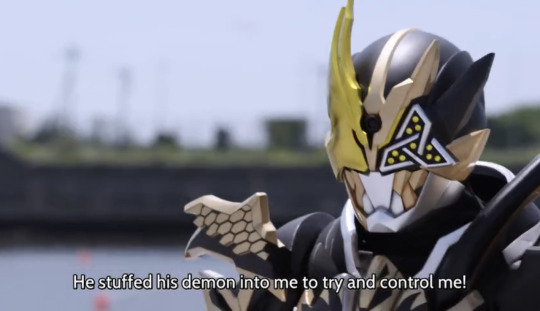
Now, onto George Karizaki’s dilemma.
One of the ways the George inner-demon reveal can be read (aka the way I read it) is as a metaphor for CSA. (Child Sexual Abuse.) How the scene is shown, the translation, and the fact that George’s bodily autonomy is being violated by his father, is why I came to this conclusion. This would also further explain George’s unusual sexual-coded interest in older men/father figures/authority figures. Victims can seek out the same type of abusers in order to have “control” over their own situation this time around, ergo “winning.” Though it never quite does work out that way. Either way, basically, if George is flirting/making the advances, then he has the control.
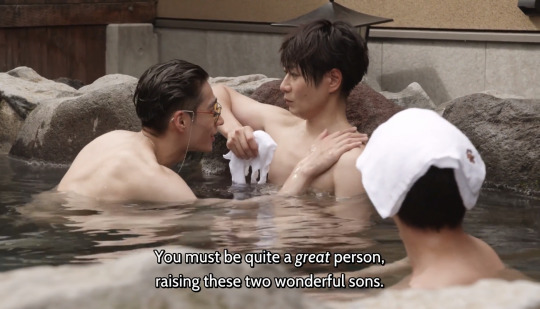
All throughout the show George is usually the one to initiate physical contact with others, not the other way around. And when it is the other way around? George has never once reacted positively, instead forcibly removing the hand/touch from his body.
Of course, this might’ve just been the actor being silly/doing something he finds amusing, for when he does things like flirting with the Igarashi father in episode 8 at the hot springs. But it still shouldn’t be ruled out imo.
One of my first questions at George's inner-demon reveal was: “How does this differentiate from the intergenerational trauma passed down to Ikki from his own father?” Ikki’s situation (mostly with Vail) is often seen as a physically and emotionally abusive relationship. Ikki literally uses himself as a shield to protect his other siblings from his father’s inner demon. Vice, Ikki’s own inner-demon, is modeled after Vail, his father’s demon. Vail caused Vice to be created. I could wax poetic on this forever. But in examination and comparison to George’s situation, I found that the difference was in the actions the fathers took. Genta failed to protect his family from his inner-demon and hurt them, both physically and emotionally. But, George? George’s sense of bodily autonomy is being violated. His father, in fear of losing his son, decides to do something to his body that can never be undone; and he does it in his sleep. All without George knowing or realizing what’s going on.
The entire situation reads to me as CSA.
That’s the difference in the traumas being passed down; because unfortunately, it is a common fact for victims of CSA to become perpetrators of it when they’re older. Once again it’s about revisiting the trauma but from the winner’s side. Which is a disgusting thought process/reasoning, but that is the underlying motive. Now, was his father abused that way? As the audience, we can’t be sure. We know from separate Revice releases that the father, Masumi, worked as a scientist in a position lacking power—but that’s all we really know about his side of the story. The only thing that hints at it being like that is the knowledge of this being an intergenerational trauma being passed down from father to son. Literally, the same inner demon. Plus, the fact that it is being passed down from body to body.
This is George’s essential dilemma—how he should view his father who was a good dad in most aspects up until the inner-demon insertion, and abandonment.
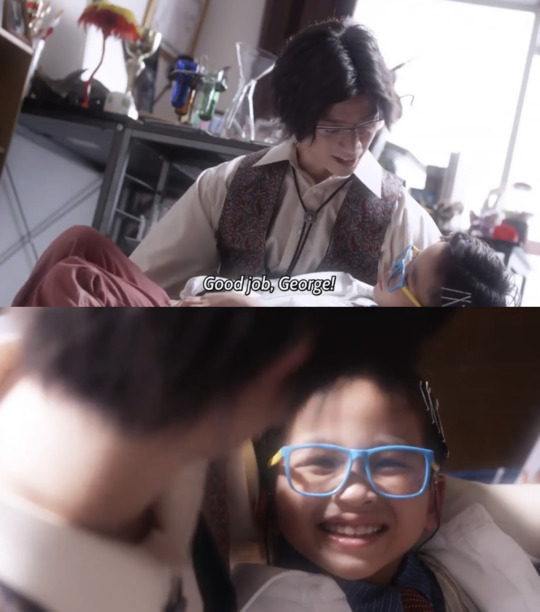
This is why George states that it would be easier to forgive his father if he were really dead.
The entire scenario does nothing but fill George with turmoil. How can he reconcile these two facts? The good and loving memories versus the abandonment and bodily autonomy violation. The bad things should make his father irredeemable, unforgivable, evil. But he was still George’s father. One who gave him a majority of good memories when he was around. The situation here isn’t black or white but a complex gray area.
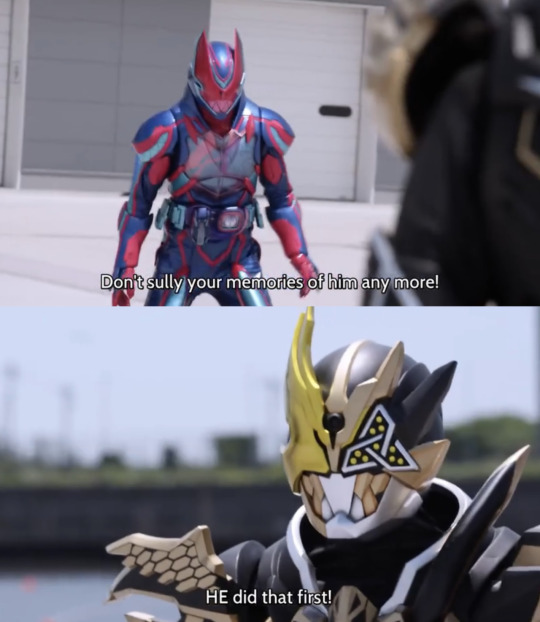
Even Chic, George’s inner demon, shows aspects of this: George and his father’s love for science (good)—but twisted into something ugly, and, humor—George’s way of coping. A perfect mix of the trauma and how it both drives George/causes him to react a certain way (masking, etc.). That’s what Chic represents. A trauma inherited from his father.
So, George Karizaki is a “tragic clown paradox” because of this gray situation he finds himself trapped within. It’s a lose-lose. The jester’s met his match. Humor finally wasn’t enough to mask his pain. So George did the next best thing: he became the villain. (Juuga)

A few things to note now that we’re coming to the end of my essay: (1) this situation reminds me of two other things—Perks of Being a Wallflower (Charlie), and Eliot’s situation in Mr. Robot. In BOTH cases (spoiler) the MC has been a victim of CSA by someone close and very dear to their heart. In Perks it’s by Charlie’s favorite person—his aunt, and in Mr. Robot it’s by Eliot’s father. Both Charlie and Eliot repressed these memories and went on remembering their abusers as people they really loved and who really loved them. Yet, once they remember what happened to them…sh*t hits the fans. Here’s a clip from Perks of the scene where Charlie remembers/finds out what happened:
WARNING: The videos below might be triggering, watch at your own caution.
youtube
Here’s a clip for when Eliot finds out:
youtube
In both, finding out had (obviously) detrimental effects on them. But even before that, their trauma is shown subconsciously. For Eliot, his personality split in order to protect himself. For Charlie, his depression and suicidal ideation. The same can be said for when George finds out. George literally slowly loses his mind, with the catalyst of his father dying adding to previous stress, and instead tries to destroy his father’s legacy by attacking his friends. All so that he can feel more in-control. All so he can feel he has power over his father. So yeah, Charlie and Eliot’s stories reminded me a lot of George’s, which only strengthened my previous assumption of his inner-demon metaphor being about CSA trauma.
Other things to note: (2) George uses touch to manipulate others, often initiating contact when trying to get someone to do something. Such as an arm over shoulder. For George, this can show that to him, touch equals power and control. Especially over others. (3) I think this is one of the reasons why George works out a lot. He worked out enough so that if someone touches him, he can physically remove the touch himself. No more letting others have control over his body without his consent.

#yeah this is triggering#yeah its totally my interpretation of the inner demon reveal#yeah the writers probably didn't mean for it to be interpretated this way#but I did so 🤷🤷🤷🤷🤷🤷#I hope this analysis at least explains my thought process somewhat#I know this is a hot take but its the way my brain saw the scene#and it's been like that ever since#(clown noises)#kamen rider revice#kronthescoup#ikki why is ur demon so cringe#revice analysis#george karizaki#george karizaki analysis#revice#kr revice#revice spoilers
11 notes
·
View notes
Text
AHHHHHHHHH!
Last week I posted this long rambling about Favorite Part, especially as it coincided with both the series concluding AND also with me finding that there is an English fan translation of the series. So... hah... yeah... we are in that “finale” due date period.
It’s a series I want to talk about with other people so much, and while the fan TL is just still in the start/prologue, I don’t think it will be easy for me to shut up until time comes on and the last chapters are translated.
Again, it’s a series I really want to talk about with others, and I feel somewhat sad that I ramble and ramble, and I don’t think ppl will get what I’m saying, until it is widely available for everyone (me included) to get it.
So, uhm...
I will be non-spoiler free from now on in this post (although I’m going to be generalizing a lot of stuff here due to plot’s stuff). I don’t think I am going to reveal everything going on, and these aren’t my final thoughts about the series due to:
a) There’s still a chapter left (published in September 26th, 2019 -Wed 25th in my timezone), so finale-finale? This isn’t, there’s the other half of the finale left.
b) I STILL LACK FULL CONTEXT OF STUFF HAPPENING HERE AND THERE DUE TO LANGUAGE BARRIERS.
c) Most of these are my most raw feelings right now. I might be wrong about stuff, but... ehhh... you know...
I will start saying one thing: the finale does feel rushed.
Then again, the last... 10 chapters or so feel rushed as well. I am not saying it’s a total bad thing, but I’m certainly to blame the last arc and events around it, especially as they escalated too quickly and, at least for me, they came out from the left field. The nature of this arc (involving a stalker with goons under their wing) was a serious one, and it became dangerous as I never expected the stalker kidnapping someone in this whole mess. Someone that, by the way, seemingly was starting to overcome one of their traumas just before this happened... and I couldn’t believe how foolish they were to FALL into it.
The aftermaths of this event don’t seem to be fully solved (I don’t think only by my POV and lack of context), yet, and it also left lots of questions surrounding the main figure who was stalked here.
And, tbh, it felt... odd. (It didn’t help finding out in the same chapter that the series was ending). I am certainly wishing there’s a mention about them in the last chapter. But this is mostly my wishful thinking talking, as they became a popular character, and it’s not like I didn’t care for them either... it’s... complicated... they were interesting and there’s lots of stuff here and there about them that don’t have answers, and you just... don’t simply introduce a stalking side-plot by having it half-solved. Fans simply want to know what happened to them.
That being said, I wouldn’t be 100% surprised if they don’t appear again.
Thinking back, there’s something that stroke me recently as I was talking about this with a friend. What if this romance and drama webtoon was heavily inclined to be about Woojoo and Hanbyeol? Like... What if it was a love story about “healing” and “reconciling” both past and present? As in, “what if we implied we have changed, but actually we haven’t changed that much”? For them both in personal senses... for them both in a relationship.
Btw, I love this ship, and certainly, I may be biased... but then... it started to make sense as I reviewed the series again?
Like, Woojoo was certainly a mess when she is introduced: lack of self-confidence, lack of self-esteem... and she only knew a kind of love where she would be on the sidelines, obssessing over someone whose face was pretty... and opening her arms to the first person who had a pretty face... but everyone and their dog told her that he was an asshole. “You can’t judge a book by its cover”, basically.
And it was pathetic, and it was pitiful. And the worst thing is? She was aware of it... but couldn’t do something against it because she felt no one else would love her.
But, her insight starts to change when she meets Hanbyeol, a pretty sweet and optimistic guy (at the time, overweight as her), who also has his inner demons.
And they get along in a weird but wholesome way. He also confessed to her that he had a crush on her.
But there’s something that happens at the end of the prologue that these both argue and don’t see each other in a year.
And the thing is? At first, I felt that Hanbyeol was resentful against her over what happened... but he is also surprised that she has been attempting to change her old ways ever since the last time they met. And he truly wanted her to be happy (despite his lingering feelings for her, too) and was deciding to let her go... except things weren’t this way when he finds out that she was involved in a scheme that would hurt her.
They start getting along again aftewards. But... she is still afraid to see his now-slimmed face, because she knows... she knows she doesn’t want to repeat the same mistakes she did in the past.
Here is what happens afterwards: they get along, they start going out again, they start to confide in each other again, and they TALK to each other again. They find themselves in a comfort level zone they weren’t in the past. And one simple near glimpse at his face and she finds him handsome... but she stars feeling conflicted about it. Eventually, she starts worrying more and more about him... and you get the idea, and wants to help him the same way he has been doing in the past... ALSO, she finds out more about his inner demons and, that perhaps, she was wrong in misinterpreting his way to cope things when he confessed to her why he liked her at the start.
Sure, many of these thing could be interpreted as platonic, too... but, honestly?
There’s also some kind of “love triangle” introduced, but... at the same time I don’t know if to define it as “love triangle”. SURE, the thing is THERE. but... I suppose it was to “heal”, not exactly “who is she ending up with at the end”.
SO... I MEAN, by now it’s kinda obvious who ended with who, right?
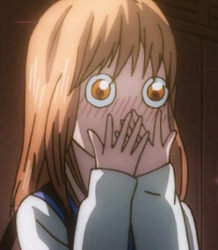
(Reaction pic is relevant, I also prepared myself while reading OreMono vol 8)
I would have been more surprised if those feelings between Hanbyeol and Woojoo weren’t mutual, lol. Especially when I realize that subtlety and “love language” don’t necessarily has to be 100% obvious except for the people involved. And Tarly managed show most of their relationship as potentially romantic with subtlety and growth.
And you could discuss that Hanbyeol was simply being a “nice guy”, and that Woojoo was only being a “good friend”... but, even so, even if they started as friends, and while I would have been okay with a platonic ending between those two... I started to realize “they care for each other in their own ways, go lengths to help/save each other and also comfort them” were a few things that I liked too much of “friends to lovers” stuff when done alright. IT WAS ALL THERE.
I WISH I COULD HAVE LIVEBLOGGED THIS BUT MOST OF MY FEELS WENT FROM “YOOOOOOOO” TO “OH, MY POOR BBY” BECAUSE THE ENDGAME FEELS RIGHT?
ALSO, I liked that them ending together also doesn’t magically fix all their inner demons. They still have their anxieties, their fears, their insecurities... but they have the support of each other. They accept each other for whom they are, because while there’s always a favorite part you like of someone... when you realize it’s only a part of their whole self you also love too much.
But, damn... the way they kissed (because they DID!) was more or less on the same frequency I imagined it, lmao. BUT, YOOOOOOOOO... that was too much too handle for my poor (and “not wanting to be hor*ny on main, but...”) heart.
I cannot express my happiness over this, although the most important thing is that... THERE’S STILL A WEEK LEFT. It’s probably mostly to epilogue stuff and conclusions besides afterwords.
*Praying they don’t get separated, again... I WAITED A YEAR, THEY DESERVE TO BE TOGETHER*
I still echo my selfish feels about hoping Woojoo doesn’t get pressed to lose weight. For how the cliffhanger (?) looks like, I don’t think that would be the case?? But I’m not too sure. Because, hey, one of the reasons I started reading this series is how it portrayed a fat female lead with lots of personal issues, and I like how it opted to not solve them by simply losing weight as THE solution to “accept yourself” . sure, I suppose I wouldn’t be mad if she lose it by own decision or a “culmination” of sorts??? I dunno, perhaps I’ll have mixed feelings at worst.
0 notes